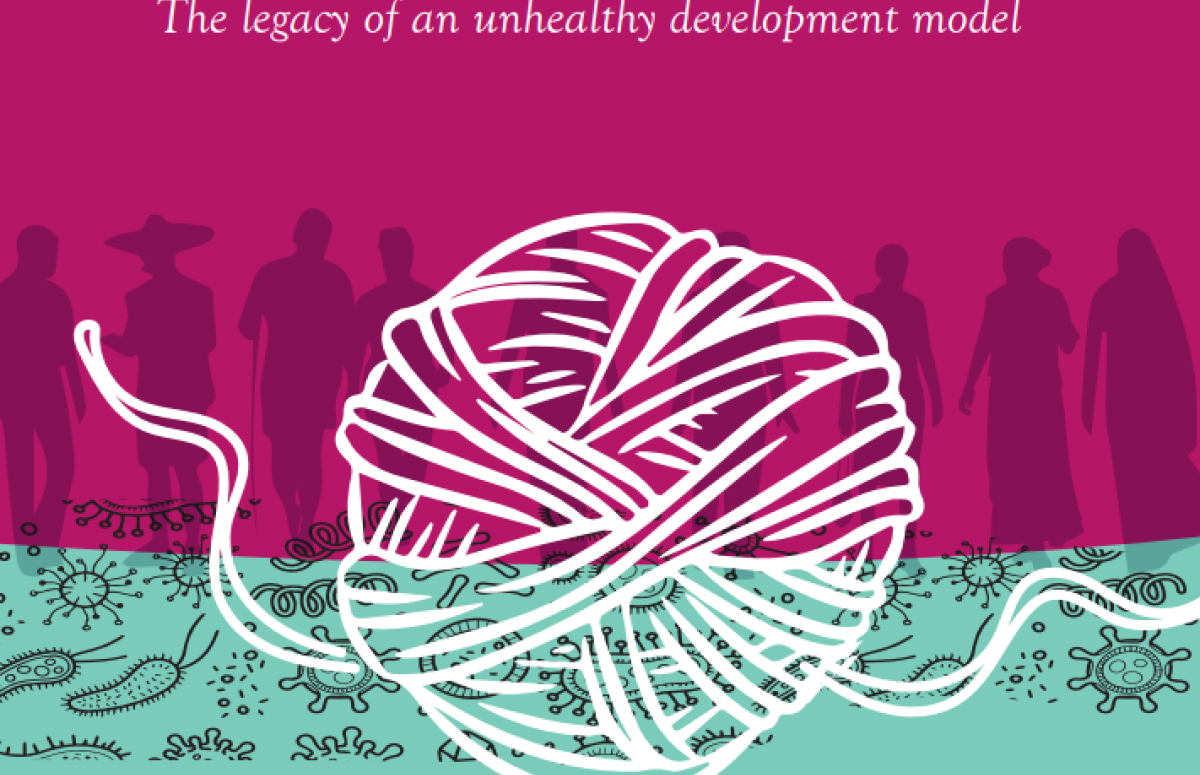Organizers of the event:
The panel debate, hosted by the civil society platform the Geneva Global Health Hub (G2H2), is co-organized by Society for International Development (SID) together with El Colegio de la Frontera Sur (ECOSUR) and SEATINI Uganda.

Context
A few weeks before the 156th Session of the WHO Executive Board, a series of public briefings and policy debates organized by the Geneva Global Health Hub (G2H2) aims to provide spaces for sharing, assessing and debating health policy and governance challenges within and beyond the items covered by the formal agenda of WHO EB, bridging from health policies to people’s realities, addressing determinants of health and promoting democratic governance.
For more information on the G2H2 Policy Debates and the other sessions organized, click here.
Description
At the end of 2023, the European Commission decided to greenlight 10 more years of glyphosate use. This decision represents a true disaster not just for biodiversity, soil and water, but for health too, as proven by several independent scientific studies. The toxic deliberation to extend glyphosate authorization clashes against the 2015 IARC/WHO statement about the “convincing evidence” that glyphosate can cause cancer in laboratory animals, and that the substance is “probably carcinogenic”. It is also a violation of the EU Pesticide Law, which imposes the adoption of the precautionary principle in case of scientific doubts. The Pesticide Action Network (PAN Europe) took formal procedural steps for a review of the EC decision in January 2024, but these were rejected, and that is why the network has decided on 11th December 2024 to fight this decision at the EU Court of Justice.
Glyphosate is the top selling herbicide and the flagship of chemical agriculture. Already Monsanto, now owned by Bayer, has had to settle 100,000 Roundup cancer lawsuits in past years, paying out as much as USD 11 billions to cancer survivors (as of May 2022), and 30,000 more are pending. The PAN litigation will be a tough court case, as the stakes are high. Bayer, Monsanto and other producers might join the side of the European Commission in this court case. They have done this before. This means that PAN lawyers will have to face a battery of well prepared and extremely corporate well-funded opponents. The EC decision bypassed recent scientific evidence, favouring a new round of hazards on human health.
Moreover, the role of glyphosate in the emergence of antimicrobial resistance (AMR) has scientifically come to the fore. Despite AMR being a silent pandemic increasingly profiled in the global health agenda, there remains a dramatically low number of publications linking glyphosate use and the rise of AMR. The herbicide was registered as an antibiotic in the USA in 2003, and in Europe in 2014. The relevance of the PAN court case needs to be examined in this scenario and in the context of what countries (like Mexico) have been doing to phase out of glyphosate to limit AMR spread.
SID webinar focused on this case, in the context of the WHO debates on the pandemic treaty, One Health and the fight against AMR, taking stock of the research work conducted in this area in past years.
Panelists:
- Angeliki Lyssimachou, Pesticide Action Network Europe
- Erica Lissette Hagman Aguilar, Formerly with the Comisión Intersecretarial de Bioseguridad de los Organismos Genéticamente Modificados (CIBIOGEM)
- Jane Nalunga, Southern and Eastern Africa Trade Information and Negotiations Institute (SEATINI Uganda)
- Karen Friedrich, Fundação Oswaldo Cruz (Fiocruz) / Associação Brasileira de Saúde Coletiva (ABRASCO)
- Jakeline Pivato, Campanha Permanente Contra os Agrotóxicos e Pela Vida
Moderators: Nicoletta Dentico, SID and Cecilia Elizondo, ECOSUR
Useful Material:
- Society for International Development, Untangling Antimicrobial Resistance (AMR): The Legacy of an Unhealthy Development Model
- Nicoletta Dentico, Development Journal Editorial: One Health—Anatomy of a Fractured Vision
- Ramazzini Institute, Global Glyphosate Study Pilot Phase Papers
- Timothy A. Wise, Eating Tomorrow – Agribusiness, Family Farmers, and the Battle for the Future of Food
- PAN Europe, Banning the use of glyphosate-based herbicides in the EU
- Journal of Environmental Protection, Environmental Exposure to Glyphosate and Reproductive Health Impacts in Agricultural Population of Argentina
- Daily Express, CSOs push for ban on highly hazardous pesticides on Ugandan market
- Use of genetically modified crops and pesticides in Brazil: growing hazards - Almeida et al, 2017









